|
|
|
Sort Order |
|
|
|
Items / Page
|
|
|
|
|
|
|
| Srl | Item |
| 1 |
ID:
132258
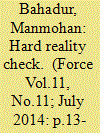

|
|
|
|
|
| Publication |
2014.
|
| Summary/Abstract |
Uttarakhand is one of the youngest states of India, formed just 14 years ago on 9 November 2000. It is also home to some of the most sacred shrines - Yamnotri, Gangotri, Badrinath and Kedarnath. One of these four sacred dhams of the Hindus, Kedarnath, was in the news for the devastating floods that struck it and the adjoining hills last year on June 16. It took some time for the extent of the calamity to hit home. The first person on the scene was an ex-Indian Air Force (IAF) pilot, Sqn Ldr Bhupinder VrC (fondly called Bhupi in the IAF) who was flying a civil charter helicopter in the area. Bhupinder was asked by the civil administration to fly to Kedarnath and Rambara to check what was wrong as all contact had been lost with the civil administration. In the words of Bhupinder,
"…I got a shock of my life as Rambara, a huge place, did not exist at all." This set in motion a flurry of activity, resulting in the mounting of perhaps the greatest heli-lift and rotary wing relief operation in the history of aviation.
|
|
|
|
|
|
|
|
|
|
|
|
|
|
|
|
| 2 |
ID:
131918
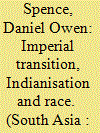

|
|
|
|
|
| Publication |
2014.
|
| Summary/Abstract |
This article examines the colonial legacies in the development of the Indian and Pakistani navies following Independence. As both navies struggled with problems of indigenising their forces, Britain endeavoured to maintain its regional hegemony by extending the professional dependency of both. The influence of imperial ideologies and racial discourses of power on these relationships and on Indian naval identity caused India's and Pakistan's navies to evolve in different directions, as did Cold War geopolitics and civil-military relations. By analysing the challenges faced by India in achieving strategic independence, this article widens existing debates surrounding the neo-colonialism of Indian governance and education during the Nehruvian period, the reinvigoration of Empire and the limits of British imperial power after World War II.
|
|
|
|
|
|
|
|
|
|
|
|
|
|
|
|
| 3 |
ID:
133353
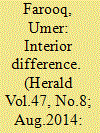

|
|
|
|
|
| Publication |
2014.
|
| Summary/Abstract |
The two have traditionally had different relations with the top military leadership. Due to his family's military background, Khan always fancied himself as his party's natural choice for overseeing civil-military relations. Asif, on the other hand, has had a history of strongly opposing the role of the military and intelligence agencies in civilian politics
|
|
|
|
|
|
|
|
|
|
|
|
|
|
|
|
| 4 |
ID:
131058
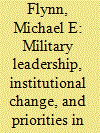

|
|
|
|
|
| Publication |
2014.
|
| Summary/Abstract |
How does political competition among domestic actors influence foreign policy choice? Studies examining these questions often focus on the role of economic or partisan interests, and how they influence the preferences of decision makers who are subject to electoral institutions and pressures of their constituents. Less attention has been paid to how the preferences of other influential but unelected actors influence state behavior. I examine the influence of one such group by looking at how American military leaders shape decisions on military spending and force structure, while also examining how these decisions have been affected by changes to the institutions governing civil-military relations. Results indicate that military leaders occupying key positions can influence defense spending priorities in favor of their respective branches. Results also suggest the influence of military leaders has changed and is conditional upon the institutions governing the relationships between civilian decision makers and military leaders
|
|
|
|
|
|
|
|
|
|
|
|
|
|
|
|
| 5 |
ID:
132538
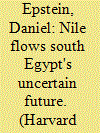

|
|
|
|
|
| Publication |
2014.
|
| Summary/Abstract |
As US citizens celebrated their independence and self-rule on July 4, 2013, they opened their newspapers to find that Egyptians had surrendered theirs. The previous day, amid impassioned protests across the country against the Muslim Brotherhood-led government, the Egyptian Armed Forces removed President Mohammad Morsi from power. For a time, the move dominated headlines. Columnists, academics, and statesmen debated the ethics and ramifications of the coup. But soon, the world moved on. Despite Egypt's vital ongoing struggle to build a nation, coverage of the effort moved out of the mainstream. Now, almost nine months later, Egypt deserves a second look. In late January 2011, Hosni Mubarak, who had governed Egypt since 1981, was overthrown after weeks of mass protest across the country. In the November elections the Muslim Brotherhood, previously illegal, was swept into power with 52 percent of the vote. In June 2012, Muhammad Morsi, a member of the Brotherhood, became the first freely elected President in Egyptian history. Egypt's (seemingly) successful transition to civilian rule drew accolades from the international community. Another victory for democracy. But things were not as rosy as they seemed.
|
|
|
|
|
|
|
|
|
|
|
|
|
|
|
|
| 6 |
ID:
133125
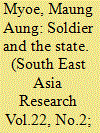

|
|
|
|
|
| Publication |
2014.
|
| Summary/Abstract |
The government of Myanmar is today publicly committed to building a 'modern developed democratic nation'. It has initiated a number of measures aimed at political and economic liberalization. This article examines the military's perception of the ongoing process of liberalization. It argues that, on the basis of mutual understanding and smooth relations between the government and the military at both individual and institutional levels, the military is likely to continue its support for the political liberalization measures initiated by the President and supported by the National Assembly. However, the military is not yet prepared to tolerate any structural changes that would undermine its national political role, the basic principles it has laid down for national unity, or its institutional autonomy.
|
|
|
|
|
|
|
|
|
|
|
|
|
|
|
|
|
|
|
|
|